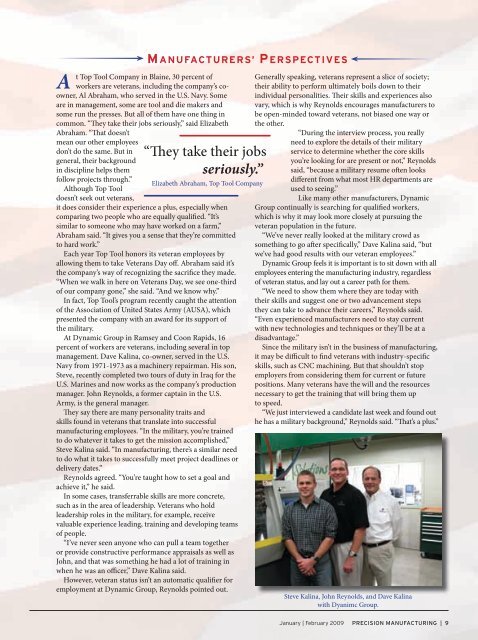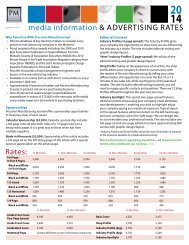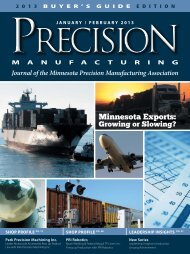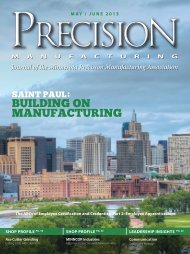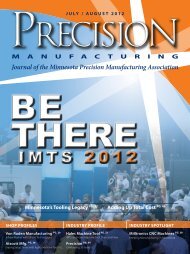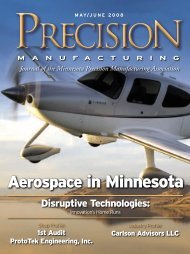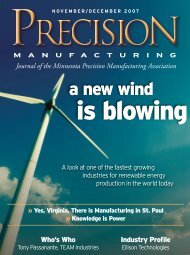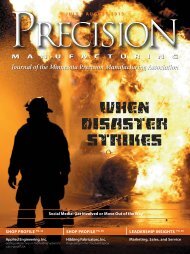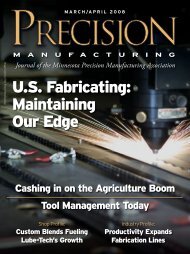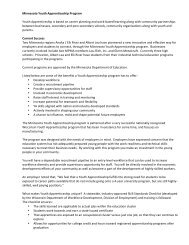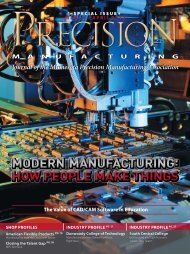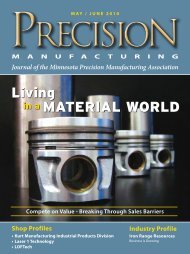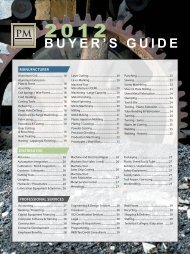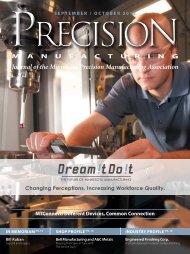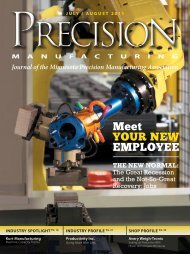January / February - Minnesota Precision Manufacturing Association
January / February - Minnesota Precision Manufacturing Association
January / February - Minnesota Precision Manufacturing Association
- No tags were found...
You also want an ePaper? Increase the reach of your titles
YUMPU automatically turns print PDFs into web optimized ePapers that Google loves.
At Top Tool Company in Blaine, 30 percent ofworkers are veterans, including the company’s coowner,Al Abraham, who served in the U.S. Navy. Someare in management, some are tool and die makers andsome run the presses. But all of them have one thing incommon. “They take their jobs seriously,” said ElizabethAbraham. “That doesn’tmean our other employeesM ANUFACTURERS’ P ERSPECTIVES“They take their jobsseriously.”don’t do the same. But ingeneral, their backgroundin discipline helps themfollow projects through.”Although Top Tooldoesn’t seek out veterans,it does consider their experience a plus, especially whencomparing two people who are equally qualified. “It’ssimilar to someone who may have worked on a farm,”Abraham said. “It gives you a sense that they’re committedto hard work.”Each year Top Tool honors its veteran employees byallowing them to take Veterans Day off. Abraham said it’sthe company’s way of recognizing the sacrifice they made.“When we walk in here on Veterans Day, we see one-thirdof our company gone,” she said. “And we know why.”In fact, Top Tool’s program recently caught the attentionof the <strong>Association</strong> of United States Army (AUSA), whichpresented the company with an award for its support ofthe military.At Dynamic Group in Ramsey and Coon Rapids, 16percent of workers are veterans, including several in topmanagement. Dave Kalina, co-owner, served in the U.S.Navy from 1971-1973 as a machinery repairman. His son,Steve, recently completed two tours of duty in Iraq for theU.S. Marines and now works as the company’s productionmanager. John Reynolds, a former captain in the U.S.Army, is the general manager.They say there are many personality traits andskills found in veterans that translate into successfulmanufacturing employees. “In the military, you’re trainedto do whatever it takes to get the mission accomplished,”Steve Kalina said. “In manufacturing, there’s a similar needto do what it takes to successfully meet project deadlines ordelivery dates.”Reynolds agreed. “You’re taught how to set a goal andachieve it,” he said.In some cases, transferrable skills are more concrete,such as in the area of leadership. Veterans who holdleadership roles in the military, for example, receivevaluable experience leading, training and developing teamsof people.“I’ve never seen anyone who can pull a team togetheror provide constructive performance appraisals as well asJohn, and that was something he had a lot of training inwhen he was an officer,” Dave Kalina said.However, veteran status isn’t an automatic qualifier foremployment at Dynamic Group, Reynolds pointed out.Elizabeth Abraham, Top Tool CompanyGenerally speaking, veterans represent a slice of society;their ability to perform ultimately boils down to theirindividual personalities. Their skills and experiences alsovary, which is why Reynolds encourages manufacturers tobe open-minded toward veterans, not biased one way orthe other.“During the interview process, you reallyneed to explore the details of their militaryservice to determine whether the core skillsyou’re looking for are present or not,” Reynoldssaid, “because a military resume often looksdifferent from what most HR departments areused to seeing.”Like many other manufacturers, DynamicGroup continually is searching for qualified workers,which is why it may look more closely at pursuing theveteran population in the future.“We’ve never really looked at the military crowd assomething to go after specifically,” Dave Kalina said, “butwe’ve had good results with our veteran employees.”Dynamic Group feels it is important is to sit down with allemployees entering the manufacturing industry, regardlessof veteran status, and lay out a career path for them.“We need to show them where they are today withtheir skills and suggest one or two advancement stepsthey can take to advance their careers,” Reynolds said.“Even experienced manufacturers need to stay currentwith new technologies and techniques or they’ll be at adisadvantage.”Since the military isn’t in the business of manufacturing,it may be difficult to find veterans with industry-specificskills, such as CNC machining. But that shouldn’t stopemployers from considering them for current or futurepositions. Many veterans have the will and the resourcesnecessary to get the training that will bring them upto speed.“We just interviewed a candidate last week and found outhe has a military background,” Reynolds said. “That’s a plus.”Steve Kalina, JohnReynolds, and Dave Kalinawith Dyanimc Group.<strong>January</strong> | <strong>February</strong> 2009 PRECISION MANUFACTURING | 9


